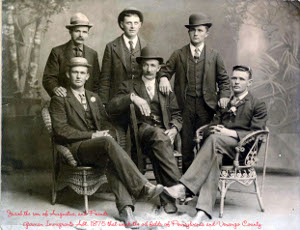
Stories
Overview of Our History
It's 1854. The great wave of German immigrants to the United States following the crop failures of 1846-1847 and the failed revolutions of 1848-1849 peaked. The Crimean War is underway in Eastern Europe, the Republican Party is forming in Wisconsin, and the Kansas-Nebraska act, which contradicts the provisions of the Missouri Compromise is about to become law � helping fuel the division in our country, towards a Civil War.
Perhaps it was the times; perhaps it was a longing for the villages left behind. Whatever the reason, in the fall of that year 6 men began meeting in a 3rd floor room at 75 East Washington Street, in a room rented to Eduard Longerich. With Longerich on the guitar, these men shared camaraderie, and sang songs of die Heimat � the Homeland.
By the spring of 1855, these men were confident enough in their abilities to present themselves to the public as The Indianapolis Maennerchor. On May 28, 1855 the first public performance of the Maennerchor was held at Washington Hall, performing a variety of folk and classical songs, beginning a musical tradition in Indianapolis that has continued unbroken for over 150 years.
That fall, Longerich returned to Germany. And like the Civil War looming in the nation�s future, a miniature civil war broke out in the Maennerchor in the spring of 1861, with the group splitting into two rival singing groups: the Maennerchor and the Konkordia. But just as the nation would heal, by 1863 these two choirs reunited under the Maennerchor name.
Following the war, the Maennerchor established itself as a classical musical society in Indianapolis, moving into the old City Hall in 1878. Beginning a tradition that would last for over a hundred years, the choir began featuring guest artists � vocal and instrumental � in concerts. In those years the choir performed both operatic and classic four-part choral songs, usually in the German language.
By 1904, as the Maennerchor celebrated its fiftieth anniversary, the choir was not only a musical but also a significant social organization. In anticipation of continued growth and prosperity, the group planned for the future. Two years later ground was broken for what would be the Maennerchor�s home from 1907 to 1936: The Academy of Music, also known as the Maennerchor Building. Located on North Illinois Street, this building, complete with auditorium, restaurant, and club rooms, represented the pinnacle of the Maennerchor�s musical influence in Indianapolis.
Winds of change were in store for the Maennerchor shortly after its move into the new building. Whether called "The Great War" or "The War to End All Wars" or by the now common name of World War I, the confrontation between Germany and the United States again turned brother against brother, this time on an international scale. In Indianapolis, all things German became suspect: sauerkraut became �victory cabbage,� das Deutsche Haus became the Athenaeum, churches changed their services from German to English, and the German language fell from favor in Indianapolis.
The Maennerchor struggled in those post war years to maintain its identity as a classical music and social organization. The choir suffered financially due to the death of its principal benefactor John P. Frenzel in 1933, and by 1936 the Maennerchor was forced to surrender title to its home of nearly 30 years, accepting the offer of the Athenaeum Turners to make the Athenaeum its home.
Fate again dealt the Maennerchor and all things German another cruel blow: World War II. Like its predecessor, this war again brought suspicion on German language, culture, and organizations. Even though many of its members were bravely fighting in both the European and Pacific theaters, the Maennerchor found itself under investigation, due to its membership with the North American Sangerbund, which was under investigation at the time, as well as its German heritage. These were again struggling years for the Maennerchor, as our country was at war, fighting for a set of ideals we still promote today.
The men returning from World War II sought to return to normalcy, and in those years, the Maennerchor experienced a renaissance: with over 120 men on stage, the Maennerchor performed to many full houses in the Athenauem's auditorium, often with renowned guest artists from the New York City or the Metropolitan Opera; it joined with the Knights of Columbus and the Murat Shrine Chanters for a Triad Concert; it hosted an Evening of Song at Clowe�s Hall to raise scholarship funds for high school music students. Those nights were indeed a grand night for singing!
What began over 150 years ago as a small German men�s chorus has evolved over the years, into a multi-cultural choir today. Originally singing primarily songs in the German language, today the Maennerchor performs primarily songs in English.
The past fifty years have been years of change for the Maennerchor: the choir itself is significantly smaller than it was just 25 years ago. But one thing that will never change: we remain committed to our mission of singing, bringing quality male chorus singing to the citizens of Central Indiana.
Over the stage of the old Maennerchor building was written "Sangesfreudig, treu und wahr, sei unsere Losung immerdar." Loosely translated, it means "Songs with friendship true and strong, to these we pledge ourselves forevermore." The Maennerchor believes these words sum up why the group continues to hold an important role in our culture today.